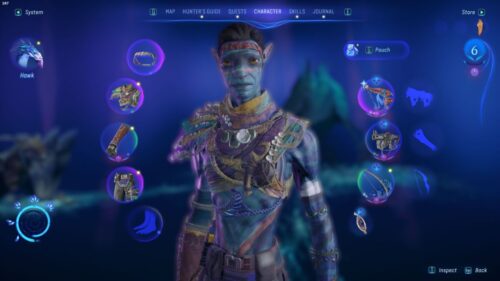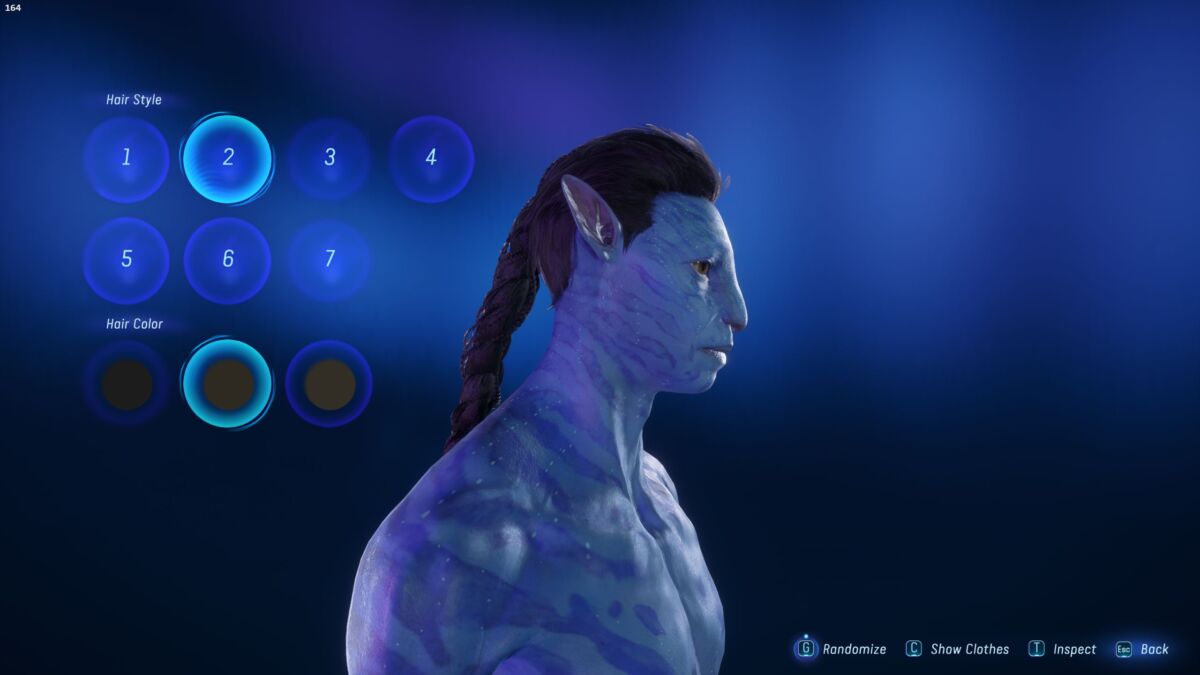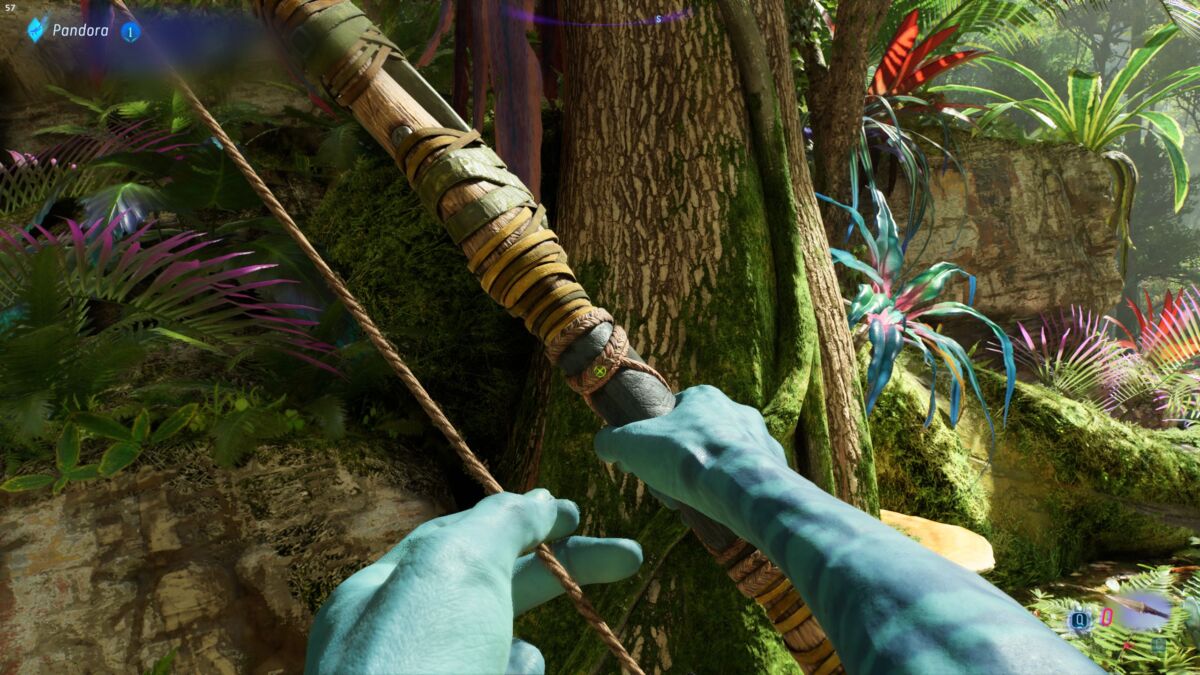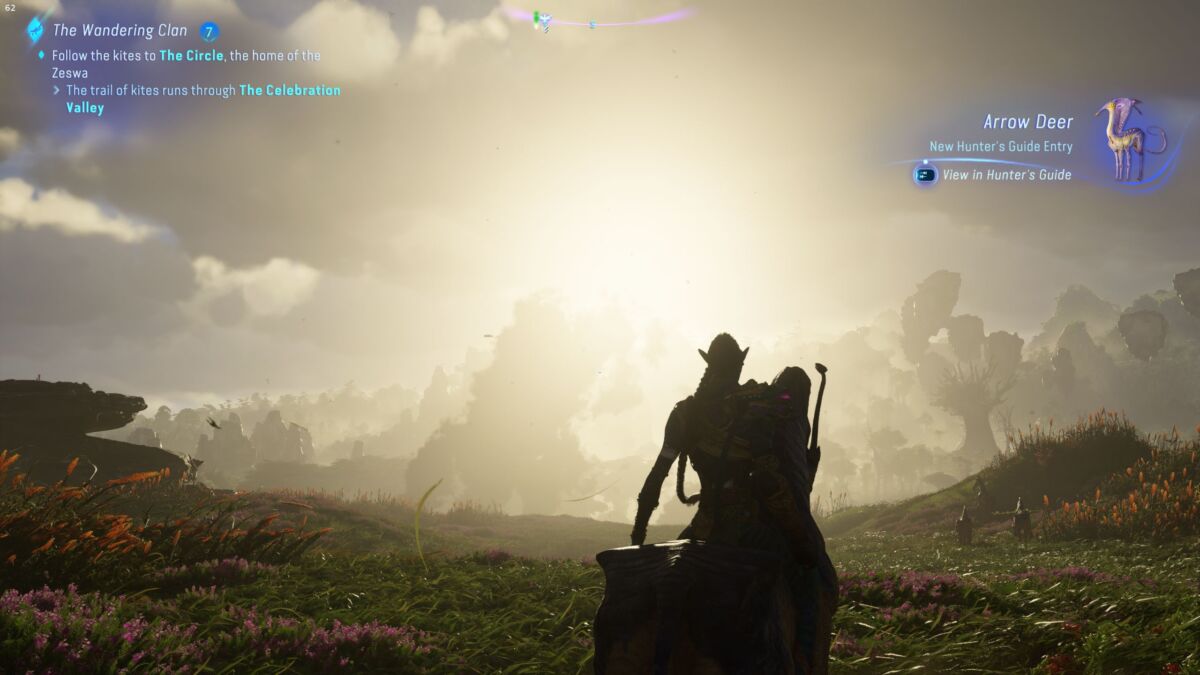
An open world game based on Avatar makes just a whole load of sense. Pandora is one of the most vibrant, unique environments seen in cinema since the turn of the century, the plot is about as binary of a “good vs. bad” as media can get, and the giant flying lizards make the perfect stand-in until we get the next Panzer Dragoon game (which is never). Avatar: Frontiers of Pandora is the final AAA open world game in a year absolutely packed with them, but despite having so much potential to explore and innovate, it’s somehow one of the most forgettable, if not outright disappointing games I’ve played all year.
Developed by Ubisoft Massive of The Division 2 fame alongside Lightstorm Entertainment, Avatar: Frontiers of Pandora sees you playing as a customisable young Na’vi who’s been brought up in murky circumstances by the dastardly RDA, who are so one-notedly evil that it’s no wonder you can almost spell naive with “Na’vi”. A handful of establishing scenes later, you’re free to roam Pandora, take on the RDA, and find out the background of the long-gone Sarentu clan that you stem from, while falling into the open world trap of doing everything for everybody because NPCs are lazy.
However, very little of that will feel relevant once you step out into the wide world of Pandora for the first time. Fallout 3’s vault escape still has my favourite instance of this in any game, but Frontiers of Pandora comes pretty close in terms of wow factor. Pandora feels positively alive and teeming with life from the moment you step foot on its soil, packed with more flora and fauna than I think I have ever seen in a video game. It’s a bit of trade-off in performance to have so much going on so often, though does capture the wonder of its cinematic counterpart very well.

There’s also plenty of wonder to be found in flying around Pandora on your Ikran, your giant flying lizard who you can name and also pet (very good). This is undoubtedly Frontiers of Pandora at its very best, with the horizons often being absolutely stunning and the scale constantly impressive. Again, Ubisoft Massive has captured that movie magic superbly here, and anyone who likes the bombast of James Cameron’s blockbusters will certainly feel well catered to.
While there are a few key differences, the most obvious touchstone for Frontiers of Pandora is Ubisoft’s own Far Cry series. Both are first-person, feature camps to clear, skills to unlock, and gear to collect, and they also have crafting pretty deeply baked into the experience. Frontiers of Pandora does, however, feel a lot less bloated than some of Ubisoft’s other open worlds and wants the player to find things out in the world rather than barraging them with map icons. Make no mistake, there’s still a lot of filler stuff to do here, from mind painting, to tuning wind instruments, to hunting, but it feels quite restrained by open world standards, with players using their special sense to see objectives in the distance. It’s not quite as immersive as the wind system seen in Ghost of Tsushima, but it’s a step in the right direction.
Avatar: Frontiers of Pandora draws you further into the world of Pandora by letting you hunt animals and gather plants, which can be used for making food and crafting gear. The cooking of meals is very obviously inspired by recent Zelda games with you able to mix multiple ingredients to make dishes (while you hum a little ditty) to give you temporary buffs and regain stamina, which is pretty uniquely applied here. Instead of limiting your sprinting, low stamina means that your health doesn’t automatically regenerate. It’s a bit annoying to have to eat a freaky omelette in the middle of battle when you’re out of healing, but does at least do something different from the norm.
The hunting is also more interesting than some may expect, with players able to find specific animals in certain locations, meaning they do actually need to do a bit of hunting by referring to their Hunter’s Guide rather than just wandering towards an icon on their map. The quality of meat is also determined by how mercifully and cleanly you kill your prey — drop them with a single arrow to a weak point and the resources you gleam will be of a higher rarity. Shoot them up with an AR and it will be totally ruined. It’s not quite Hunting Simulator, but it certainly feels like Ubisoft’s best attempt at this kind of system yet, even if the inability to lay traps is a shame.
However, Avatar: Frontiers of Pandora takes about nine steps back as far as its quests are concerned, with it feeling like we’ve somehow massively regressed from The Witcher 3: a game that Ubisoft has taken big inspiration from in recent years, but also one that came out in 2015.
To call Frontiers of Pandora’s quests repetitive really undersells it, as it’s almost difficult to believe how truly uninspired they are in the vast majority. You’re either going somewhere and looking around with your Na’vi vision to find a clue, using a tool to hack a computer, or both, often on multiple occasions within the same quest. I started counting how many times I had to take part in the utterly insipid, uninspired hacking mini-game in the same quest and just gave up after the sixth instance. It honestly feels like they put all of the hacking in as a placeholder for other, actually fun stuff that just never came. You’re playing as a giant blue cat creature on an alien planet, yet still end up doing a lot of the same mundane stuff that was already made boring by Watch Dogs.
Combat breaks up some of the quests, and while the gunplay is as solid as it always is in Ubisoft games and shooting people in the head with arrows will always be high on my list of necessities for any FPS, it, too, is guilty of not feeling alien enough. Again, you’re a giant blue cat person, but you just feel like the stretched out version of any open world protagonist, except you can jump higher and human enemies look like ants. Simply exploring feels a tad laboured sometimes, as you’re nowhere near as fast on your feet as you might expect for a Na’vi, and the lack of real fluidity in climbing to rival even something like Dying Light is puzzling when Na’vi are shown to be very nimble in the movies.
Most firefights will see you come up against AMPs (big manned robots), with you having to shoot weak points to easily take them down. The combat is definitely fun, but it really does feel like Ubisoft Massive were afraid or unable to take many leaps with the license in terms of what Na’vi can do, basically hamstringing your abilities in the process. I’m not asking for Shadow of Mordor levels of ridiculousness here, but Frontiers of Pandora’s progression feels rather languid due to its underwhelming skill trees.
Rather than a traditional levelling system, Frontiers of Pandora depends mainly on gear to determine your level, with skill points given out for completing quests and interacting with saplings. There are five different skill trees — Survivor, Warrior, Hunter, Rider, and Maker — with you able to increase your health, ammo etc. by dumping points into each. You may also interact with Tarsyu Flowers to unlock Ancestor Skills, which feel like they’re meant to be a much bigger deal than they actually are, as they’re often just basic upgrades and a handful of new abilities in among stat increases and the like. There are even Apex Skills that are unlockable after you unlock everything else within the same tree, but these are again just not worth the effort bar one that allows you to instantly revive. Is being able to have more powerful gear really that important by the time you unlock that Apex Skill dozens of hours into the game? From experience, absolutely not.

Really, it feels like the gear in general is also underbaked, with you swapping out items so often to make the numbers go up without ever really getting a tangible sense that it’s doing anything for the breadth of gear available. You have to grind to afford certain gear from vendors, but what’s the point when it feels like the enemies are also hitting harder and you will find better gear out in the world anyway? Mods can give you certain buffs, but again there’s little perceptible change apart from what the numbers tell you has changed. The weapons are equally disappointing, as you can find a whole array of different versions of a particular weapon, but they all function largely the same. The assault rifle, for instance, fires the exact same way no matter what rarity you have. You grind for gear not because you’re excited to try out different builds and experiment with a playstyle, but because you feel like you have to in order to get anywhere. For all its flaws, even Far Cry 6 made outfit-swapping like a Sims fashion show feel like you were actually doing something.
Avatar: Frontiers of Pandora isn’t a bad game, but it doesn’t strike me as one that will be fondly remembered for too long either, especially as it’s positively packed with microtransactions from day one — there are seven different screens from which to buy things from the in-game store. In a year featuring open worlds like Sons of the Forest, Marvel’s Spider-Man 2, Hogwarts Legacy, Dead Island 2, and Tears of the Kingdom, it’s hard not to be left feeling a little blue by Frontiers of Pandora.
A PC key was provided by Ubisoft PR for the purposes of this review.
Some of the coverage you find on Cultured Vultures contains affiliate links, which provide us with small commissions based on purchases made from visiting our site.


